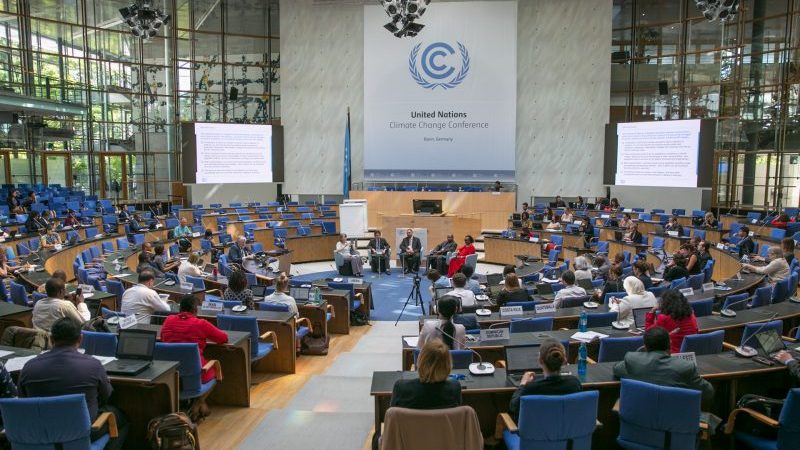Sexual harassment is going unreported and unpunished in the confidential atmosphere of UN climate negotiations, a veteran of the process warned on the eve of talks in Bonn.
In a deeply personal article for Climate Home News, lawyer Farhana Yamin shared her experiences and encouraged others to speak up. Yamin described two incidents from the 1990s that she had kept quiet for decades, even from her family.
One concerned a senior colleague demanding that she deliver briefing papers to his hotel room late at night. Despite qualms about her personal safety, she went to the hotel, but refused to enter his room. He then lost interest in the papers, she recalled, and ignored her for the rest of the negotiating session, leading her to fear for her job.
She said other women at UN climate negotiations had shared similar stories with her, in private.
Now aged 52, Yamin said she feels progress has been made on women’s empowerment. But she told Climate Home News she has informally advised young women to avoid certain men with a reputation for inappropriate behaviour, including some still active in the process.
At the upcoming talks, the UN is responsible for security within the Bula – negotiations – zone, while the German government has jurisdiction over the Bonn – civil society – zone and surrounding city.
Patricia Espinosa, executive secretary of the UN Framework Convention on Climate Change (UNFCCC), said: “Harassment of any kind and in any circumstances is unacceptable and we have zero tolerance for such acts in conferences and in our workplaces. I would urge anyone – woman or man – to speak up and speak out. They can be confident that UN climate change staff will listen, be supportive and assist in referring cases to the relevant authorities.”
A code of conduct issued by the German government states that “no participant shall harass or threaten any other participant”. Those who do not follow the rules may be kicked out of the conference.
The Fijian presidency of the talks said adopting a gender action plan, which aims to boost women’s participation in the UN climate process, was a key priority for the meeting.
“Any action or behaviour that runs counter to this goal, including sexual harassment, is totally unacceptable and we fully support the UNFCCC’s policy of zero tolerance,” said Fiji’s chief negotiator Nazhat Shameem Khan.
Have you experienced sexual harassment or assault at UN climate negotiations? Tell Climate Home News your story. Any information you share may be published, but we will not identify you as the source without your consent. Email [email protected], message by WhatsApp or Signal to +44 7725 738315 or use this form, which allows you to remain anonymous.
Following the wave of harassment and assault allegations against Hollywood mogul Harvey Weinstein, many victims of predatory sexual behaviour – mostly women – have been moved to share their stories. Twitter reported the hashtag #MeToo was used by 1.7 million people in 85 countries in the two weeks after allegations surfaced.
These accounts covered incidents ranging from sexualised comments to rape. A common theme was feeling unable to get redress for harmful behaviour because the perpetrator had more power.
“There is a compelling moment and a bigger realisation… of how these small individual acts can be really damaging to women’s reputation, their careers and their mental health,” Yamin told Climate Home News in an interview.
Yamin has been involved in the UN climate process since 1991, advising various national and NGO delegations including small island states, least developed countries and the EU. At the upcoming meeting, she will be on the Marshall Islands team.
From her long experience of the process, she observed power imbalances within and between delegations that can make some delegates vulnerable.
At the last round of talks in Marrakech, more women led national delegations than ever before, but men still retained 73% of those top jobs.
Rules within UN delegations prohibit members from speaking about what happens inside to those outside.
“That closeted atmosphere favoured the bullies,” Yamin wrote in Climate Home News. And if reporting harassment from a senior member of the same delegation might jeopardise the victim’s job – as a younger Yamin feared – making allegations against a member of a different delegation risks causing a diplomatic incident.
While she did not wish to name the perpetrators of harassment she experienced two decades ago, Yamin offered to support others in challenging the culture of silence.
“In my particular case, I feel some of those things were issues that were very painful, but I have reached some kind of closure,” she said. “There are other examples which are far more recent. The thing to do is establish a much safer route and a space for a discussion.”
